No, polar bears do not eat Arctic foxes. They like to eat high-energy food like seals and other marine animals. The blubber of these animals is highly caloric and full of fats. However, wildlife is often unpredictable. So, polar bears can also hunt Arctic foxes only when food is scarcely available. That’s why they are also called opportunistic predators.
Thus, polar bears do not like to touch arctic foxes if food is abundantly available. We can say that the relationship between Arctic foxes and polar bears is dependent on specific circumstances and the availability of other food sources. This is also worth considering that the relationship between both Arctic species is also complex. Climate, habitat conditions, and population dynamics are vital factors that play a significant role.
Do you have any idea why Arctic foxes follow polar bears? If polar bears eat Arctic foxes then how do they hunt these crazy and clever species of foxes? If you want to get answers to these questions, follow this article’s footprints.
Do Polar Bears Eat Arctic Foxes?
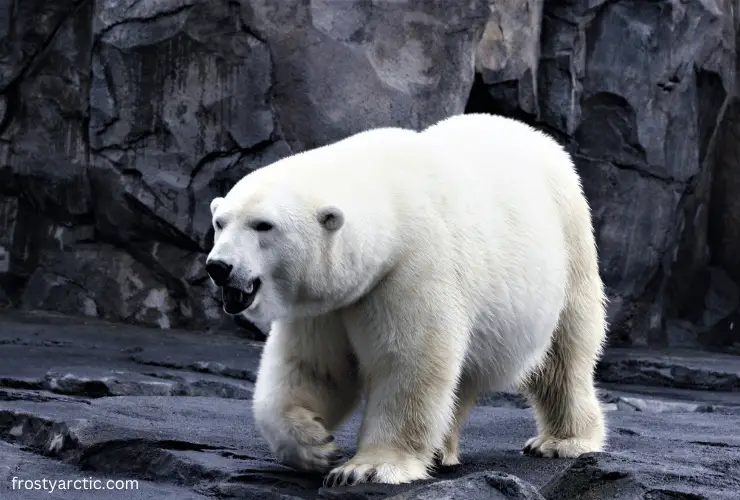
Polar bears are known as the supreme hunters of the Arctic. They do not eat Arctic foxes rather; they share their habitat with shorter animals like them. We have mentioned before in our introduction that polar bears mostly hunt smaller marine mammals like seals. In fact, seals are their favorite prey. The reason is simple. Polar bears need high-caloric and fat-rich items that are mostly available in the blubber of seals.
So, that’s the reason why polar bears do not hunt and eat arctic foxes. Polar foxes have less calories than seals. Although they eat arctic foxes sometimes, it only happens when there is no other way for polar bears to survive. Again, that is why polar bears are also known as “Opportunistic Predators.” They can eat the meat of animals that is available at the time of food scarcity.
Polar Bears try to catch mammals other than seals in summer when seals are not much available. They excel in capturing marine species due to their relatively longer necks that help them to reach into ice holes. Their razor-sharp claws and impressive swimming capabilities also come into action when needed while hunting prey.
Why Don’t Polar Bears Eat Arctic Foxes?
Apart from the demand for high-caloric food (blubber of seals), polar bears have many other reasons for not actively hunting and eating arctic foxes.
Let’s discover a few reasons why polar bears do not hunt and eat arctic foxes, regularly:
1. Size Difference
The size difference is one of the main reasons why polar bears do not try to hunt Arctic foxes. Polar bears are much larger than white foxes. They know that the energy waste in catching smaller prey like the Arctic fox is not worth the calorie gain. That’s why they do not try to hunt these smaller mammals.
2. Hunting Specialization
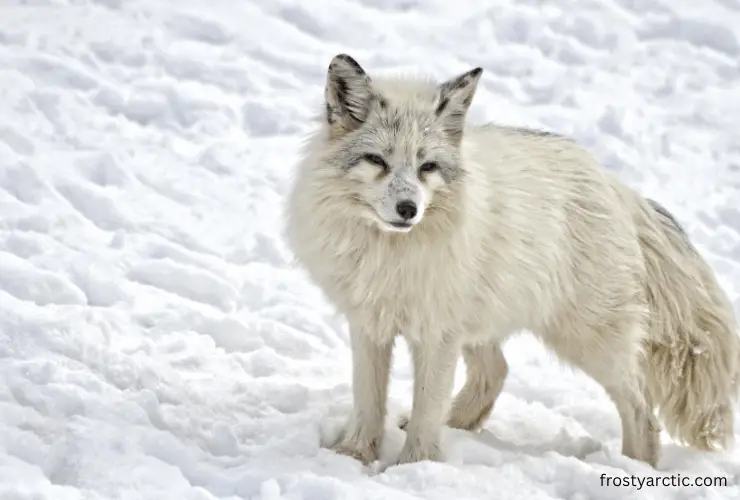
Polar bears are specialized hunters of seals. They have excellent swimming abilities and they have an amazing sense of smell to find and catch seals efficiently. However, these hunting specializations do not work on arctic foxes. That’s why polar bears do not invest energy in killing polar foxes.
3. Different Habitats
Although polar bears and polar foxes live in the same Arctic regions, they live in different habitats. You are wondering how it happens. This is because Arctic foxes tend to spend most of their time on land or near the coastlines. On the other hand, polar bears primarily hunt on sea ice. This type of distinct habitat and lifestyle reduces the likelihood of encounters. Thus, it leads to fewer opportunities for interactions.
4. Avoidance Behavior
Arctic foxes are commonly popular for their intelligence and cautious behavior. They are clever and many tales about foxes are not wrong that talk about their cleverness. That’s the reason why polar bears do not try to catch them. Because Arctic foxes always try to stay away from potential predators like polar bears and red foxes. Avoidance is better for them instead of getting in life-threatening trouble!
5. Camouflage
Polar bears often miss the fox hunting chances because polar foxes have white fur, just like ice. This coloration of fur provides effective camouflage in snowy environments. This type of physical adaptation makes them invisible to polar bears.
It is said that circumstances do not change the man, the man changes circumstances. But it is the opposite with polar bears. This is because they change their diet preferences when circumstances change. This is how they are adapted to live in the Arctic!
Do Polar Bears Share Food with Arctic Foxes?
It is also seen that both Arctic animals also share food. Do they really share or are these just rumors without any evidence? Let’s find the facts! But before that, watch this video where a polar bear is unwillingly sharing breakfast with an Arctic fox.
Polar bears do not share their food but unwillingly when their own stomach says, “STOP! I’M FULL“.
Actually, when polar bears leave the scraps and carcasses, other animals, like Polar Foxes, eat that food. However, it doesn’t mean polar bears share their food with other animals as a friendly gesture.
White foxes stalk these white bears and wait until the bear hunts and finishes their lunch or dinner. After that, arctic foxes appear and start eating the leftovers. Here is another video where polar bears share food with hungry Arctic foxes.
How Do Polar Bears Hunt Arctic Foxes?
Polar bears follow the following hunting techniques to meet dietary needs:
1. Pup Predation
Polar bears know very well how to take advantage of vulnerable prey, such as the young of other species. When Arctic foxes have their litter of pups, they create dens in the snow to protect them from the harsh environment. However, these dens are only sometimes secure enough to deter a hungry polar bear. Polar Bears find these dens and hunt them directly by digging them out of their secure places.
2. Surprise Attacks
Surprise attacks are one of the main tactics of polar bears. They are pro at hunting and catching their prey while doing surprise attacks. In fact, they are known for their ability to move quietly and swiftly across the Arctic landscape. They may launch a surprise attack when they come across an Arctic fox den with vulnerable pups and adult foxes. As a result, they caught the white foxes off-guard.
3. Scavenging Habit
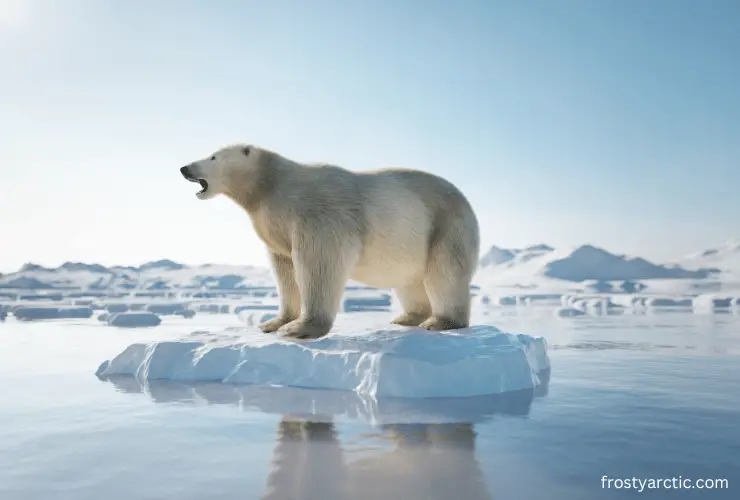
We have discussed before that polar bears are known to scavenge on carcasses and leftovers from other predators’ kills. This includes scavenging on the remains of animals like walruses, whales, and seals. If a polar bear comes across a dead Arctic fox, it may eat it. Dead foxes and marine mammals act as an extra cherry on top of the cake for them.
Why Do Arctic Foxes Follow Polar Bears? Let’s Know the Ultimate Results
Arctic foxes follow polar bears. They follow them not to hunt polar bears but for another purpose. They eat the leftover scraps or carcasses of other animals, like seals, that polar bears leave behind after finishing eating. Arctic foxes cannot hunt polar bears because polar bears are stronger and bigger than these smaller mammals.
Sometimes, Arctic foxes get caught in the strategy of polar bears. Do you know how it happens? Because when Arctic foxes follow polar bears and eat leftovers, polar bears hunt them at that time. Thus, these strategies often backfire on these clever species. As a result, white foxes get caught. Scavenging for food skills is life-threatening for them, sometimes.
According to the study of Polar Bears Facts, here is the story we found:
“Arctic foxes are good at smelling carcasses from long distances. In hunger, they get close to the dumps/carcasses. This is the opportunistic time for polar bears to catch them. So, in this way, polar foxes themselves become prey if they show up while following the smell of carcasses. Now polar bears don’t need to eat leftovers or carcasses. They can enjoy eating fresh and live 🦊 fox instead of smelly flesh.”
Important Note: Arctic foxes follow polar bears for safety! Yeah, this was also a surprising fact for us. The presence of polar bears drives away other predators.
Do Arctic Foxes Live with Polar Bears?
If we talk about the regions, then yes, arctic foxes and polar bears live with each other. They do inhabit the same general region. This is because both are native to the Arctic ecosystem. However, we don’t mean to say that they live together in the same dens or form social groups.
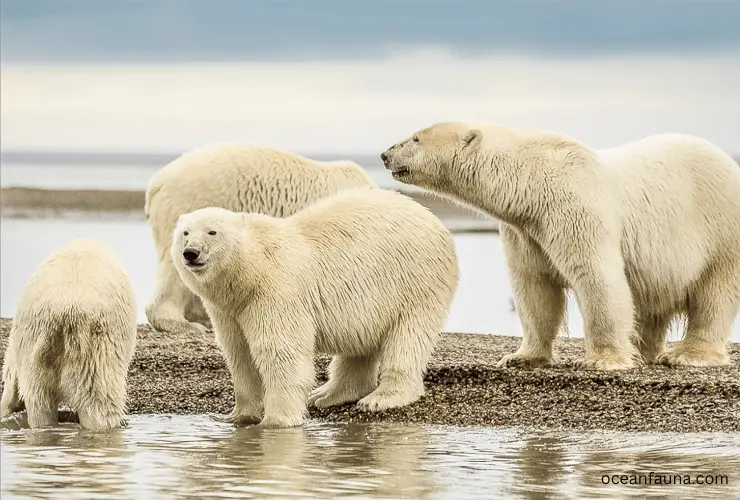
While their territories may overlap, the relationship between these two species is mainly one of competition. Overall, both share the same Arctic environment, but the lifestyles and behaviors of both species are quite different. They tend to coexist with limited direct interaction with each other. It means Arctic foxes live on the same land as polar bears, but they maintain their alleys. ~ Source
FAQs’
Do polar bears eat Arctic wolves?
No, typically not! However, it doesn’t mean polar bears can’t eat Arctic wolves or white wolves. On the other side, polar bears are also the one and only predators of Arctic wolves. This is because polar bears can get their hands on these species if other animals (i.e., seals) are unavailable.
Also, arctic wolves are bigger and other land and marine mammals can’t catch them easily. Thus, this is the same case of polar bears with Arctic foxes, where bears only try to eat arctic wolves in certain circumstances.
Do arctic foxes eat polar bears?
No. Absolutely not! Arctic foxes do not eat polar bears. They eat relatively smaller mammals and carcasses of bigger mammals. Polar bears are triple the size of Arctic foxes and stronger than other carnivores. It’s totally impossible for a polar fox to hunt and eat polar bears. However, there could be a possibility that a sick or dead polar bear could become prey to Arctic foxes.
How much do polar bears eat arctic foxes?
Generally speaking, an adult polar bear can eat 40 to 45 kilograms of seal’s blubber, according to the report of Polar Bears International organization. Arctic foxes are much smaller in size and weight than seals, ranging from 3 to 10 kilograms in weight.
That’s the reason polar bears prefer to save their energy in hunting Arctic foxes due to their smaller sizes and less blubber. However, we have seen that polar bears often eat arctic foxes, so they would need 5 to 6 smaller foxes to fulfill their dietary needs. ~ Source
What are the other predators of Arctic Foxes?
One of the primary predators of Arctic Foxes is Red Foxes. These predators are continuously competing with similar resources of Arctic foxes. They are also trying to encroach on the territories of Arctic foxes. Red foxes hunt them to reduce resource competition.
For this reason, their hunting is known as intraguild predation. Other predators of Arctic foxes besides polar bears include wolves, snowy owls, golden eagles, and wolverines. Again, all of these predators follow intraguild predation because Arctic foxes are not their main diet.
Do polar bears eat babies of Arctic foxes?
Regularly, they don’t. But, occasionally, YES! There are rare occurrences when polar bears eat the babies (pups) of Arctic foxes if they come across them. Polar bears have no mercy on these pups if they come in their way. However, always keep in mind that polar bears only do this occasionally. These are just rare cases!
Conclusion
Hence, the age-old question of whether polar bears feast on arctic foxes has been answered. They can try their hands on these clever foxes when no other bigger mammals are available. Otherwise, polar bears do not add foxes to their primary diet plan.
So guys and girls, we found that polar bears are not too keen on having Arctic foxes over for dinner parties. These furry bears are quite the picky eaters but unpredictable!
Hope you like reading about the true tale of survival, camaraderie, and occasional snacking. If anything is left unanswered, share that with us. We would be happy to include that.
Sincere thanks!

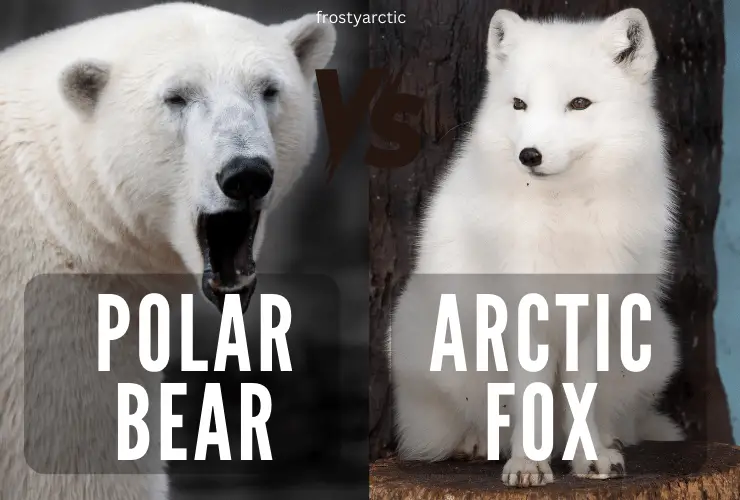

2 thoughts on “Do Polar Bears Eat Arctic Foxes? [Why or Why Not?]”